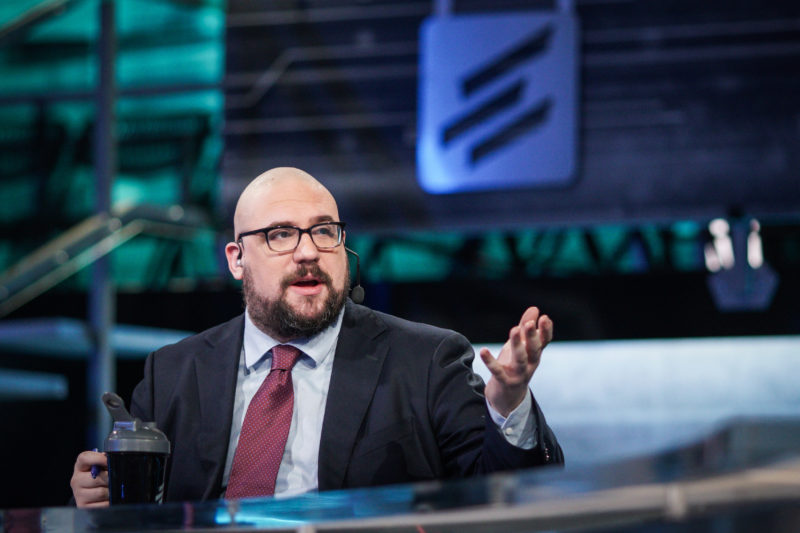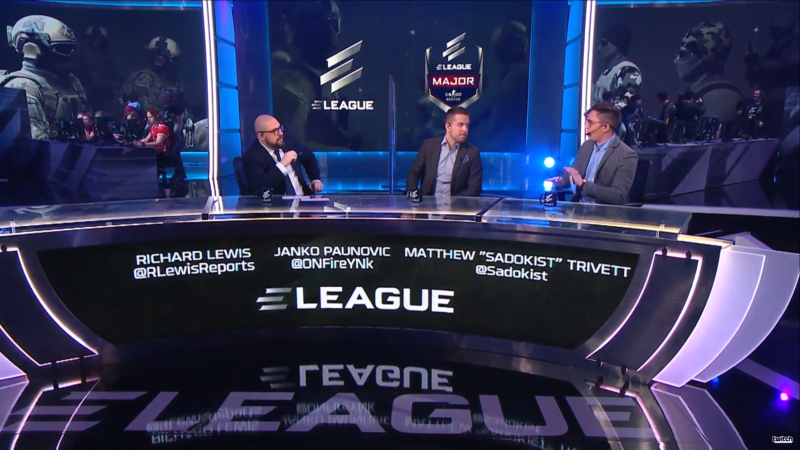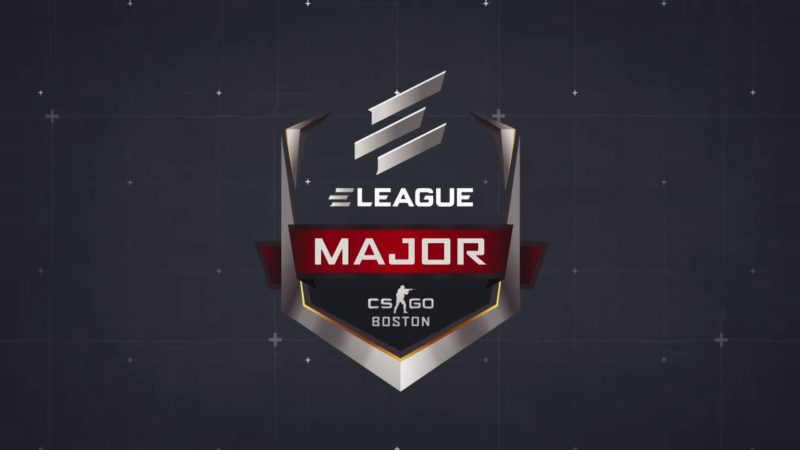“Black coffee. Strong coffee. That’s it.”
And none of the “crazy” pumpkin spice chai latte nonsense James “JZFB” Bardolph likes.
That’s Richard Lewis‘s drug of choice to get through the 12-hour days required of him as the host of ELEAGUE Major: Boston 2018, a Counter-Strike: Global Offensive tournament.
Lewis talked to The Daily Walkthrough about what it’s like to be the host of an event that has already pulled in hundreds of thousands of viewers across the world. It started Friday and goes through Jan. 28. That’s more than two weeks. He celebrated his birthday Thursday, the day before the Major kicked off, and said he has been around for so long the time commitment no longer phases him.
He tries to worry less about himself and focuses on motivating everyone else.
“There are long days. I never get too upset about that because I think of all the crew that are here at 5 a.m. and here after I go home, you know?” Lewis, a 16-year esports veteran, told TheDW. “Live events, especially like this one, can be punishing on those guys. I always come in bright-eyed and bushy-tailed with a smile on my face to keep morale up amongst those dudes. Their job is much tougher.”
One thing he’s not smiling about? The suits. Don’t get him started on the suits.

(Credit: ELEAGUE)
“I’ll be honest about it,” he said. “I hate wearing suits.” In his ideal world, he’d take a seat at the desk in a T-shirt and shorts. “That’s what I’m about. That’s how I dress outside of the game. That’s how I dress outside of TV.”
He has a set of casual clothes he brings to the studio that he changes into “as soon as possible.”
But since “the almighty decision-maker” wants suits, Lewis wears suits. He brings four to “mix and match” and said he’s nowhere near as crazy with his appearance as others can be. Auguste “Semmler” Massonnat is one of the esports personalities he said goes above and beyond. Massonnat used to be a commentator for CS:GO and recently moved over to cover Overwatch League, Blizzard Entertainment’s new esports league. Semmler, for his part, looks sharp.
“He would travel with about eight suits. It was insane. Some people like the showmanship of having an expansive wardrobe. That’s a broadcast staple. We’ve certainly had many a great anchor like that at Turner [Sports] down the years. Me, I just like to wear a plain jacket … I tend to do my expression through my ties. I’m a tie guy.”
Despite hating suits, he said overarching stresses involved with putting on esports tournaments have lessened over time as the industry and companies involved mature and become more efficient. With better organization means less 18- and 19-hour days. The 12-hour days, Lewis explained, don’t last throughout the Major. They’re commonplace in the beginning when teams have yet to be eliminated, but “it gets a little easier, a little lighter as we move through the tournament.”
Half a day is nothing to scoff at, though. It has been three days since the Major started — that’s 36 hours of work. Lewis tries to stick to a strict schedule. That means no booze, no extracurriculars and some sheep-counting before bed.

(Credit: ELEAGUE Twitch)
“As soon as you clock off you gotta hurry to your bed, get in, and make sure you’ve got a nice bedtime story waiting for you,” Lewis explained. So he manages to get eight hours of sleep, that’s great. There’s still a lot more to be mindful of than being well-rested.
“I drink a lot of water. I try and not engage in lots of high-energy stuff between the games,” Lewis told TheDW. “I’m still talking to people backstage [and] trying to keep the rest of the crew and the rest of the talent happy and upbeat. When you’re the host of a desk and you open a show and you close a show, there’s a responsibility that comes with that. Even if I was tired or I was feeling it, I would never show it.”
Something Lewis has never quite been able to overcome is maintaining a healthy diet during a job. Whether it’s because there’s not enough time or someone already nabbed all the salad, food tends to be an afterthought based more on staying energized than counting calories.
“I eat a lot, which is part of the problem. After an event, I typically balloon in weight and have to go to the gym and shed a few pounds. You’ve got to keep fuel in the machine,” Lewis laughed. “Unfortunately for me, with my time being at a bit more of a premium, I just eat whatever is there. That’s another big part of the diet problem, you know? If there ain’t no salads, Richard’s having the fried chicken again.”
Food is Lewis’s behind-the-scenes struggle. Relying on memory instead of technical assistance is his on-air one. He told TheDW his biggest weakness when he hosts events is remembering everything he needs to say. He doesn’t rely on an auto-queue and is “a fastidious note-taker.”
Those notes help him organize his thoughts and keep the desk on track because there’s no teleprompter assistance.
If his memory is cooperating, his voice may decide to bow out of the game a little too early. “My voice can blow out as well. I’ve always had a history of, by the end of events, I’m usually a bit hoarse.”
He has been working in esports long enough that he’s confident touting his strengths as much as he is acknowledging his weaknesses. Those strengths, he said, include his wit, spontaneity and ability to create and execute a vision for an event.
“I’m pretty quick on my feet. That’s been the key thing. I’m pretty spontaneous. I have a good eye for show structure and where you need to move a conversation to.”
His ability to improvise comes from years of esports trial and error. “You had no idea what was going to happen” back when esports was a fledgling industry. “Maybe a lighting rig is gonna fall over behind you and you’ve got to come up with something on the fly people are going to be entertained by.”
He does, however, start his shows with a certain amount of planning. “I generally will have some stuff prepared for the opening of the show so we can get that energy level up, loosen people up on the desk,” Lewis said. Some of that content is even a surprise to the other people he’s talking to. “When we do our rehearsals I don’t reveal the material I’ve got” because he wants the laughter to be genuine.
The Major is hosted in two different locations. Lewis is currently at ELEAGUE’s studio in Atlanta, Ga., for two portions of the tournament — The New Challengers and The New Legends. Challengers finishes up Monday and Legends starts Friday at 10 a.m. ET and goes through Jan. 22. ELEAGUE is broadcasting everything live on its Twitch channel.
They’ll later move to the Agganis Arena in Boston on Jan. 26 for the New Champions Stage, where the winner will be decided.

(Credit: ELEAGUE YouTube)
Multiple locations and over two weeks of work for the broadcast talent caused some in the CS:GO community to argue not enough people were hired for the event. Lewis said the notion that fewer people were hired because of budget or technical constraints is “complete nonsense.”
“People were thinking about it based on the way previous majors were done. The analyst desk is the analyst desk and the commentators are the commentators, and never the twain shall meet,” Lewis argued.
“The way we’ve been doing it, and we experimented with this in our regular season, was to get the commentators on the desk. Commentators have opinions about the game. We never get to hear them. We’ve got big personalities in that commentary booth, we never get to see them. So, we started putting them on the desk … I absolutely do think we put in enough talent. I doubt I’ll change my tune at the end of the event.”
He also insisted that there are a lot of unknowns working in the background that fans aren’t aware of or see in the front-facing side of an event like this Major. Without having the direct knowledge he and others have, he said it’s easy for discontent to be misguided.
“It’s great if you’ve got a theory, but if you present your theory as fact you’re probably presenting misinformation. So, the community have a lot of misconceptions, but they’re entitled to them. I’m never going to tell them not to say those things.”
While Lewis rebuffed one set of complaints, he emphasized that Turner Sports — the company he works for and which partners with IMG to put on ELEAGUE events — does listen to what people say they like and dislike.
“If people aren’t happy with the broadcast, we listen to community feedback,” he told TheDW. “We look at community feedback and then we start thinking about what we’re going to do different next time.”
Lewis isn’t too worried about griping at the beginning of the Major. He’s looking forward to the show they’re going to put on in Boston and said it’s “what they [fans] are going to say at the end of the event” that’s most important.
When the champion is crowned, the lights turned off and Lewis’s host chair left empty, he told TheDW he likes to take some time to himself. “As I’m getting older, I have a tendency, I need a good few days to recuperate,” he said.
Signup for The Daily Walkthrough and follow us on Twitter, Facebook and YouTube
